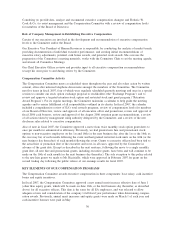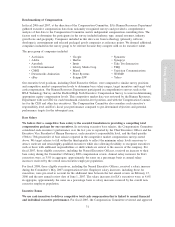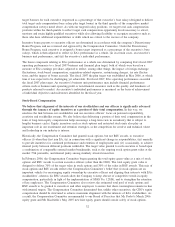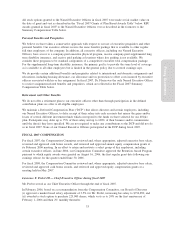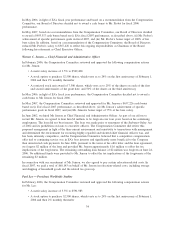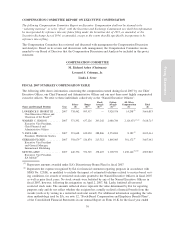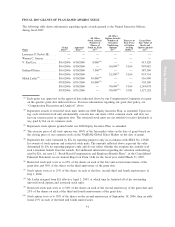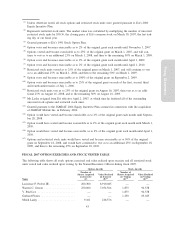Electronic Arts 2007 Annual Report Download - page 49
Download and view the complete annual report
Please find page 49 of the 2007 Electronic Arts annual report below. You can navigate through the pages in the report by either clicking on the pages listed below, or by using the keyword search tool below to find specific information within the annual report.the trading window is open, these employees are prohibited from buying or selling EA common stock while in
possession of material, non-public information and must request a trading clearance from EA’s General
Counsel prior to buying or selling EA common stock (unless such transactions are made pursuant to a pre-
approved 10b5-1 trading plan). In addition, because we believe it is improper and inappropriate for any EA
personnel to engage in any transaction designed to result in a benefit from a decline in the trading price of
EA’s common stock, EA’s directors, executive officers and other employees may not engage in short sales of
EA common stock under any circumstances, including trading in puts and calls.
IMPACT OF REGULATORY REQUIREMENTS ON COMPENSATION
Tax Law Limits on Executive Compensation
Section 162(m) of the Internal Revenue Code limits deductions for executive compensation in excess of
$1 million except for certain compensation which qualifies for a performance-based exception. Certain types
of compensation in excess of $1 million are deductible by the Company if performance criteria are specified
in detail and are contingent on stockholder approval of the compensation arrangement. The Company and the
Compensation Committee have endeavored to structure executive compensation plans to achieve maximum
deductibility under Section 162(m) with minimal sacrifices of flexibility and impact on corporate objectives.
The Compensation Committee has structured the current use of stock option arrangements in a manner
intended to achieve tax deductibility of such amounts. Although the Compensation Committee has the ability
to grant restricted stock units subject to performance factors in order to achieve maximum deductibility under
Section 162(m), it elected not to do so in fiscal 2007. With respect to non-equity compensation arrangements,
the Compensation Committee has reviewed the terms of those arrangements most likely to be subject to the
deduction limitation of Section 162(m). In fiscal 2007, the following compensation paid to EA’s Named
Executive Officers exceeded the Section 162(m) thresholds: (i) Mr. Probst’s cash compensation; and
(ii) Mr. Lasky’s cash compensation and the cash payments he received for cancelled shares of JAMDAT
restricted stock that would have vested during fiscal 2007. Pursuant to recent guidance from the Internal
Revenue Service, Mr. Jenson, our Chief Financial Officer, is not considered to be a covered employee for
purposes of Section 162(m).
For fiscal 2008, our Board has adopted an executive bonus plan under which payments made to covered
executive officers in excess of $1 million would be deductible. The executive bonus plan is subject to approval
by our stockholders at the 2007 Annual Meeting. For further information regarding the executive bonus plan,
see Proposal 4. Approval of the Electronic Arts Inc. Executive Bonus Plan above.
While the Compensation Committee will continue to consider deductibility under Section 162(m) with respect
to future compensation arrangements with executives, deductibility will not be the only factor used in
ascertaining appropriate levels or modes of compensation. Since corporate objectives may not always be
consistent with the requirements for full deductibility, it is possible that the Committee may, if consistent with
EA’s “pay-for-performance” philosophy described above, enter into compensation arrangements in the future
under which payments are not fully deductible under Section 162(m).
Accounting for Stock-Based Compensation
In fiscal 2007, we began accounting for stock-based compensation in accordance with the requirements of
SFAS No. 123(R). During calendar year 2005, we began granting restricted stock units to certain overtime-
eligible employees. In calendar year 2006, we expanded the use of restricted stock units to all employee
groups including the Named Executive Officers. The comparable expense of restricted stock units and stock
options we recognize under SFAS No. 123(R) removed a financial reporting disincentive to use restricted stock
units that existed before we began expensing stock options granted to employees and directors.
38




